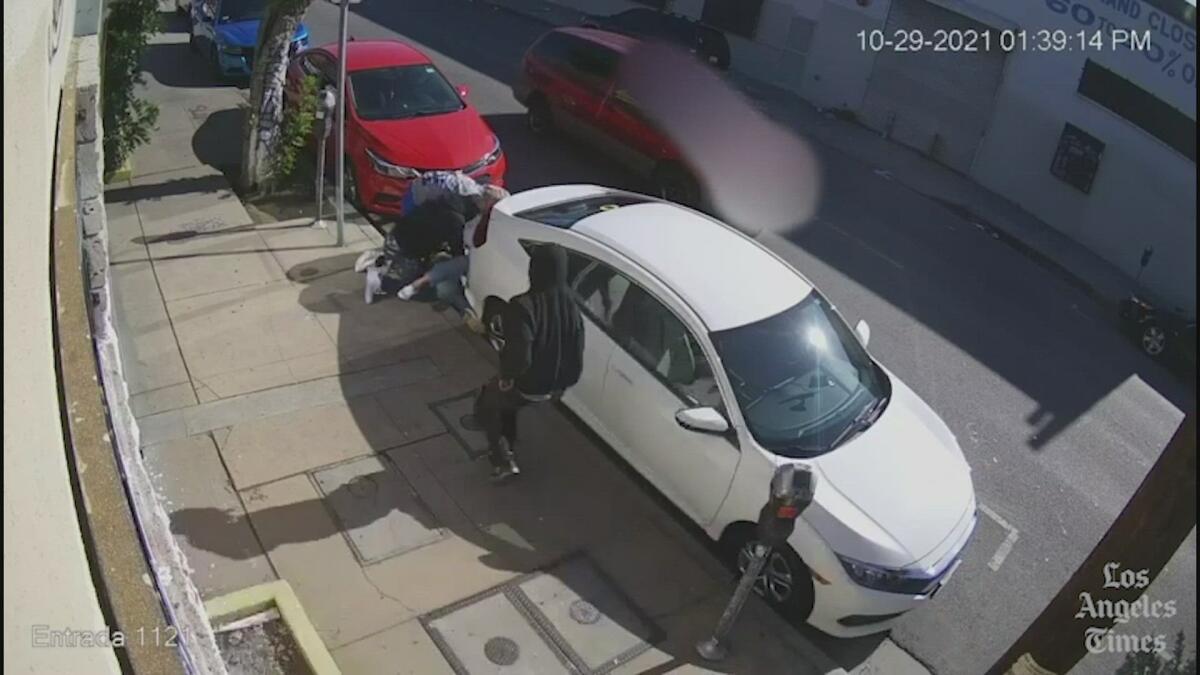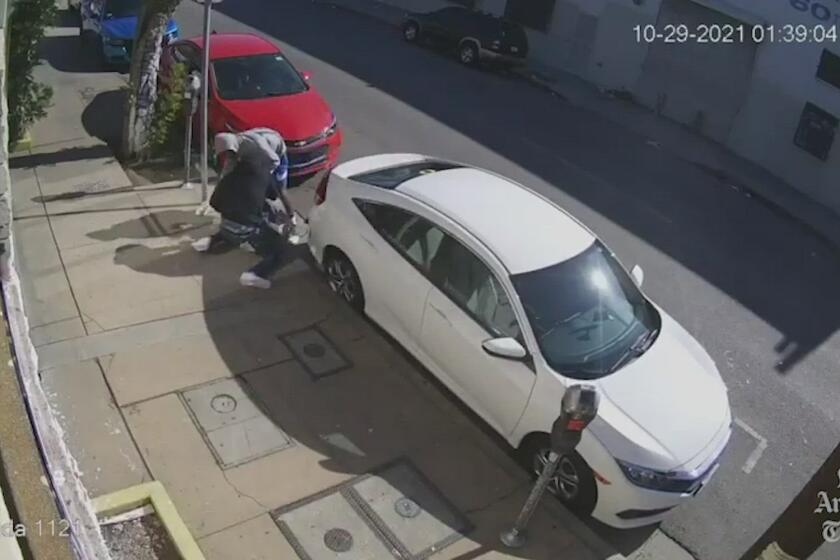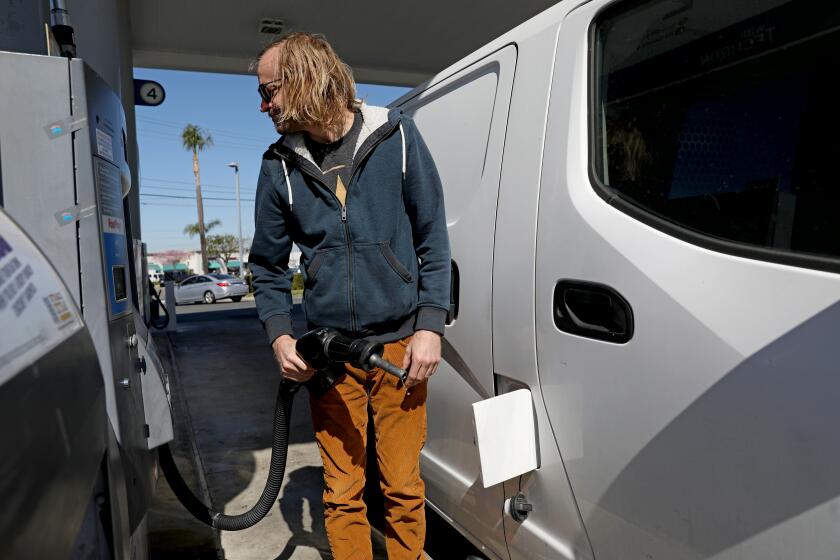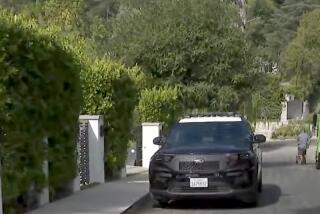Everyone has a theory of why crime is rising. This one doesn’t get discussed enough

- Share via
I’m sure you’ve heard about it by now.
The 17 gangs, mostly from South L.A., that, according to the Los Angeles Police Department, have been dispatching crews to target and rob wealthy Angelenos, following them from high-end hotels, restaurants and clubs, snatching their watches and purses.
And about the suspects who, in some cases, according to police, were released after being arrested and then committed more robberies.
I winced with concern when I heard it, immediately feeling awful for those who were attacked and then uneasy about the political implications for L.A.’s mayoral race, which already is being fueled and funded by voters’ fear of crime.
The executive director of L.A.’s Urban Peace Institute, Fernando Rejón, winced a bit too. But for somewhat deeper reasons.
Rejón spends his time working on violence prevention, helping outreach workers and police officers get trained in gang intervention tactics. As such, he’s keenly aware of how election-year, tough-on-crime rhetoric can oversimplify solutions to crime and overshadow why people resort to it in the first place.
One of the things that’s getting glossed over at the moment? The role of straight-up economics.
L.A. gangs are sending out crews to prey on the mega-rich, targeting people leaving luxury boutiques, restaurants, and nightclubs, the LAPD said.
“People are struggling,” Rejón told me. “Some people sell things on the street corner. Some people will sell drugs. Some people are involved in different aspects of the underground economy in order to survive or make some type of money.”
And then there are the people who go after those in wealthy neighborhoods. “You know,” he acknowledged, “people become targets.”
It’s actually not all that uncommon.
“There is a sizable body of research that finds a positive relationship between income inequality and crime,” said Magnus Lofstrom, policy director of criminal justice and a senior fellow at the nonpartisan Public Policy Institute of California.
Consider that, even before the trauma and economic turmoil of the COVID-19 pandemic, income inequality was more extreme in California than almost anywhere else in the U.S., according to PPIC. The richest families in the state had 12.3 times more income than the poorest families. And the gap has only grown in recent years.
So, while California is home to roughly a quarter of the country’s billionaires, we’re also home to at least a quarter of the country’s homeless people, most of whom are disproportionately Black and Latino.
A recent study from the United Ways of California found that as many as 3.5 million households in the state — 33% — are struggling to meet their basic needs. That includes some 1.1 million households in Los Angeles County.
We now have so many people without housing in just this city, deteriorating under bridges and on sidewalks, that we have no place to put them other than in hotel rooms and tiny homes the size of most bathrooms.
Meanwhile, thousands of increasingly desperate Angelenos are struggling to afford rent and avoid an eviction.
According to another recent study, this one by UC Berkeley and the Los Angeles Times, only 21% of voters said they were financially better off than they were a year ago. Another 42% said they were worse off and 34% said there had been no change.
“If everyone is in the same boat — even if it’s a difficult boat — that’s different than if you’re barely hanging on to the edge of the boat and others seem to be churning away in their super-yachts,” said Manuel Pastor, director of the USC Equity Research Institute.
California voters say gas prices are a serious problem as doubts about transit persist, according to a UC Berkeley survey co-sponsored by The Times.
The rich are getting richer and the poor are getting poorer as we emerge from the pandemic.
Not all economic desperation leads to crime, of course. But are we really surprised that, according to the LAPD, a small subset of poor people from South L.A. have brazenly turned to armed robberies to even the score?
One can apparently drive under the 10 Freeway, and according to LAPD Chief Michel Moore, rob two UCLA students of watches worth enough for a down payment on a house. And then one can head to downtown L.A. and rob someone else of their watches — as police said happened in October — and have enough money to pay that house off.
We shouldn’t be surprised that, according to Capt. Jonathan Tippet, who leads the LAPD task force that released the “follow-home” robberies report, there were 165 of these crimes in 2021. Or that there already have been close to 60 this year.
Tippet told my Times colleague Kevin Rector that in his 34 years on the job, “I’ve never seen anything like this.”
I’m not at all surprised. Because in 34 years, we’ve also never seen such income inequality.
Of course, none of this amounts to an excuse for criminal behavior. Rich people should absolutely be able to walk around with their diamond-encrusted, $300,000 watches without fear of being followed, tackled on a sidewalk and pistol-whipped by a bunch of dudes in hoodies, as the LAPD said happened to some victims.
And there certainly are things that can be done now to help make that happen for the most moneyed among us. That includes getting more guns off the streets and, yes, taking an honest, unbiased, nonpolitical look at exactly why some criminal suspects are released and others are kept locked up.
But as mayoral candidates and voters continue to talk about getting tough on crime, it’s important to recognize that these are ultimately short-term fixes.
Long-term solutions must involve scaling up the gang intervention programs that were scaled back during the pandemic, and investing in bigger and better community-based crime-prevention strategies that can help residents as well as law enforcement.
“It’s not until it’s violence in the wealthy communities that it becomes a major issue,” Rejón lamented. “The gun homicide epidemic has been rampant in L.A. for generations. We got a handle on it for like 10 years. It’s going up, but it’s not time to turn back. We need to continue to invest in broadening our understanding of public safety.”
That also means finding new and meaningful ways to address widening income inequality, particularly in South L.A. We can’t continue to treat affordability as an issue that’s somehow separate from crime.
“We don’t want shortsighted, short-term solutions for a long-term problem,” Rejón said.
More to Read
Sign up for Essential California
The most important California stories and recommendations in your inbox every morning.
You may occasionally receive promotional content from the Los Angeles Times.












